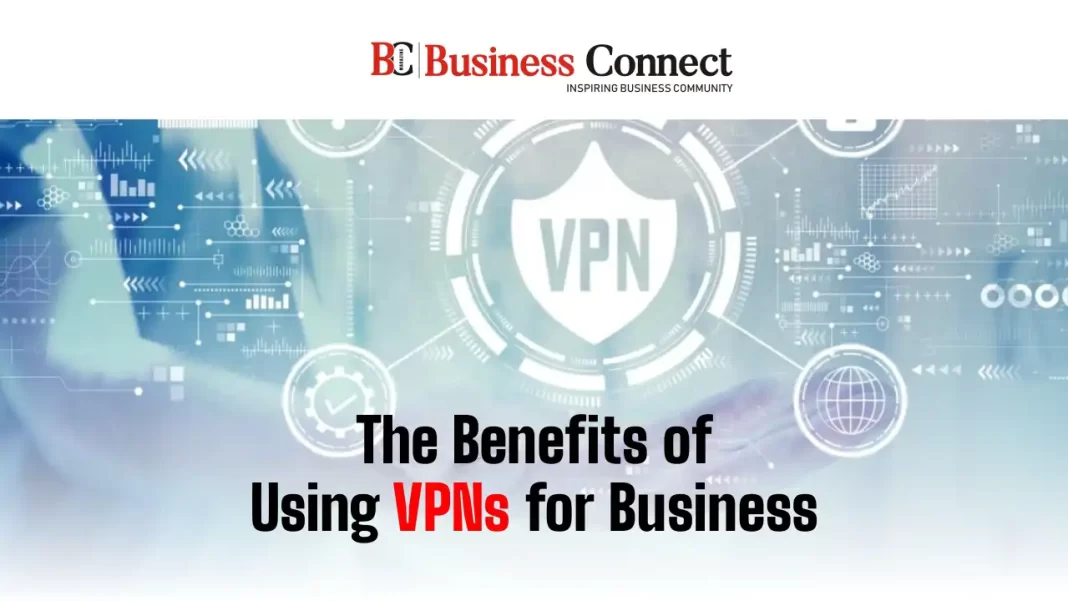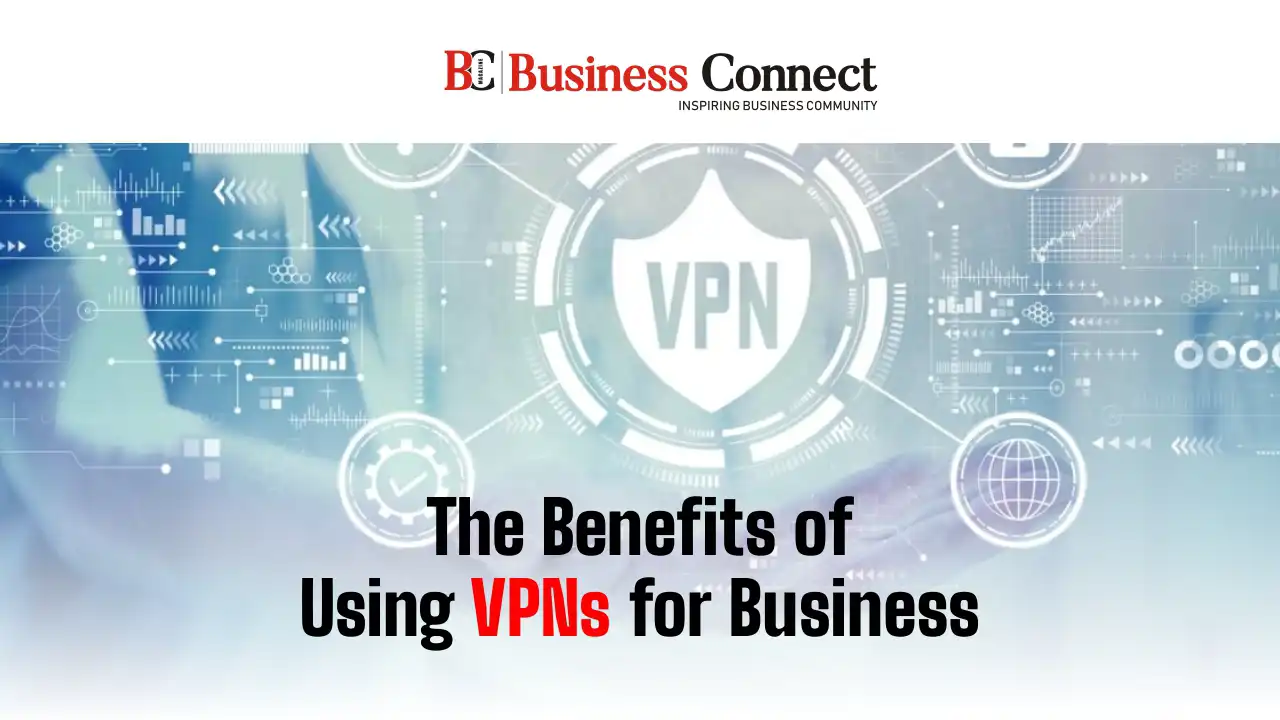Jaya Pathak
The Benefits of Using VPNs for Business
A VPN, or Virtual Private Network, is a security tool that establishes a secure, encrypted connection between a user’s device and a distant server. It creates a protected tunnel through which data travels to a remote VPN server.
This encrypted connection shields sensitive information—such as visited websites, downloaded files, and credentials—from potential threats like hackers, government surveillance, and internet service providers. By ensuring privacy and security, VPNs offer users a confidential online experience, safeguarding their digital activities from unauthorized access and maintaining the confidentiality of personal data.
In recent years, remote work and flexible arrangements have reshaped the work landscape, introducing new cybersecurity risks for businesses. With 36.2 million Americans projected to work remotely by 2025—a staggering 87% increase from pre-pandemic levels—and global cybercrime costs predicted to hit $10.5 trillion annually by the same year, the urgency for robust security measures is clear.
Amidst this digital transformation, implementing tools like Virtual Private Networks (VPNs) becomes crucial. VPNs offer enhanced security and privacy, safeguarding sensitive data and operations in the evolving realm of remote work.
Advantages of using VPNs
Using a Virtual Private Network (VPN) offers a range of benefits that enhance online security, privacy, and accessibility. Below, we’ll delve into the advantages of using a VPN in simple terms.
- Secure Your Network: A VPN helps secure your network by creating a private, encrypted connection between your device and the internet. Without a VPN, your online activities can be tracked by various entities, leading to targeted ads and potential privacy breaches. With a VPN, your connection becomes secure and anonymous, preventing unauthorized access to your data.
- Hide Your Private Information: Hackers can intercept sensitive information, such as login credentials and financial details, when transmitted over unsecured networks. However, a VPN encrypts your data, making it unreadable to anyone attempting to intercept it. This encryption ensures that your private information remains protected from malicious actors.
- Prevent Data Throttling: Data throttling occurs when your internet speed is intentionally slowed down by your ISP after reaching a certain usage threshold. By using a VPN, you can bypass data caps and prevent ISPs from monitoring your online activities, ensuring consistent internet speeds without interruptions.
- Avoid Bandwidth Throttling: Bandwidth throttling can slow down your internet speed based on the websites you visit or the type of online activities you engage in. A VPN encrypts your internet traffic, making it difficult for ISPs to identify specific websites or activities, thereby preventing bandwidth throttling.
- Get Access to Geo-blocked Services: Some websites and online services restrict access based on your geographical location. However, with a VPN, you can mask your IP address and appear as if you’re browsing from a different location, allowing you to bypass geo-blocks and access restricted content or services.
- Network Scalability: For businesses, VPNs offer scalability by providing secure remote access to employees and facilitating the deployment of cloud-based applications. With a VPN server, businesses can expand their network infrastructure cost-effectively and accommodate remote workers seamlessly.
- Reduce Support Costs: By outsourcing network maintenance and security to VPN service providers, businesses can reduce support costs associated with managing on-site servers. VPN providers offer comprehensive maintenance, performance monitoring, and security measures, allowing businesses to focus on their core operations without the burden of infrastructure management.
In a nut shell, the benefits of using a VPN include enhanced security, privacy protection, access to geo-blocked content, scalability for businesses, and cost savings. Whether you’re concerned about online privacy or seeking to optimize network performance, a VPN offers valuable advantages for both individuals and organizations alike.
Disadvantage of using VPNs
- Lower Internet Speeds: One of the main drawbacks of using a VPN is the potential for slower internet speeds. The encryption process that secures your data takes time, and certain VPNs may impact your online experience more than others. Before choosing a VPN service, it’s crucial to check its specifications to ensure that it doesn’t significantly slow down your internet connection.
- VPN Blockers: Some websites and even entire nations implement VPN blockers, which can undermine the effectiveness of a VPN. In countries like Iran, Iraq, Turkey, and Oman, using a VPN is restricted to prevent citizens from accessing content deemed inappropriate or undesirable. This restriction can limit your ability to bypass geo-blocks or access certain online services, reducing the utility of a VPN in such regions.
- Complex Configuration: Configuring a VPN involves dealing with various technical aspects, and for individuals unfamiliar with networking terminology, this can be a complex task. Choosing a VPN provider with robust support services is crucial to ensure proper setup. Alternatively, gaining a basic understanding of VPN technology by exploring “what is VPN” can be helpful. Incorrectly configured VPNs may leave communications vulnerable to threats like hackers and malware, emphasizing the importance of proper setup for effective security.
- Limited Streaming Access: While VPNs can help access geo-restricted content, they might also encounter limitations when it comes to streaming services. Popular streaming platforms often employ advanced detection mechanisms to identify and block VPN traffic. As a result, using a VPN may not always guarantee unrestricted access to your favorite streaming services.
- Potential for Logging Policies: Not all VPN providers have the same privacy standards, and some may keep logs of user activities. This can compromise the anonymity and privacy that users seek when using a VPN. It’s essential to carefully review a VPN provider’s logging policies and opt for services that prioritize user privacy by maintaining minimal or no logs of user activities.
- Costs and Subscription Fees: While there are free VPN services available, many reliable VPNs come with subscription fees. The cost may vary based on the level of security, features, and server locations offered by the VPN provider. Users should be prepared to incur additional expenses for a premium VPN service that meets their specific needs.
Suffice to say, while VPNs offer enhanced security and privacy, they come with some downsides such as potential reductions in internet speed, the existence of VPN blockers, complex configuration processes, limited streaming access, varying logging policies among providers, and associated costs. Users must weigh these disadvantages against the benefits to determine whether a VPN aligns with their specific requirements and priorities.
Exploring Cost Savings: How a VPN Can Benefit Your Business
A VPN can save businesses money in the long run. While there are initial costs involved in implementing a VPN, the potential savings from preventing costly cyberattacks or data breaches outweigh these expenses significantly. According to an IBM report, the average data breach cost $4.24 million in 2021, with many small businesses unable to recover.
Additionally, 60% of small businesses close within six months of a cyberattack. By using a VPN, businesses can avoid financial losses, reputational damage, and maintain customer trust by safeguarding sensitive data.
Moreover, VPNs help companies adhere to industry standards and regulations, further reducing the risk of penalties or fines. Overall, investing in a VPN is a proactive measure that can ultimately lead to substantial cost savings and protection for businesses in the digital age.
Uses of VPN in corporate world
In the corporate world, Virtual Private Networks (VPNs) play a crucial role in safeguarding data and enhancing security amidst the rising threat of cyberattacks. As internet usage escalates, cyberattacks have surged, with nearly 1.16 million reported in 2020, triple the number from 2019 and twenty times higher than 2016. Establishing a private Wide Area Network (WAN) is costly, prompting many companies to opt for VPNs as a more affordable solution to protect their data.
As IT companies transition to cloud-based systems, VPNs provide a vital layer of defense against evolving cyber threats. By restricting access to data and applications from unauthorized sources, VPNs ensure the integrity and confidentiality of corporate information. Access to cloud data can be restricted to predetermined IP addresses, preventing unauthorized access from external sources.
Moreover, VPNs enable access to restricted websites by masking users’ IP addresses with dedicated servers, overcoming geographic restrictions and censorship. This flexibility allows employees to access necessary resources regardless of their physical location, thereby facilitating seamless operations and collaboration across diverse regions.
Additionally, VPNs bolster productivity by enabling secure remote access to corporate networks. In scenarios where employees need to work remotely, VPNs provide a secure connection to the company’s network, mitigating the risks associated with using personal or public networks. This ensures that sensitive data remains protected, even when employees are accessing resources from various locations or while traveling.



